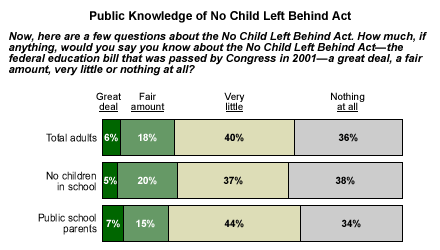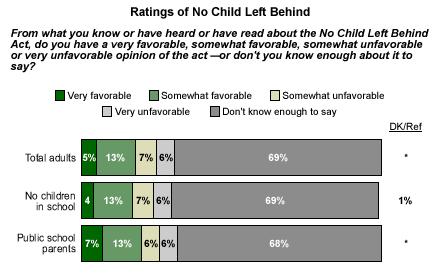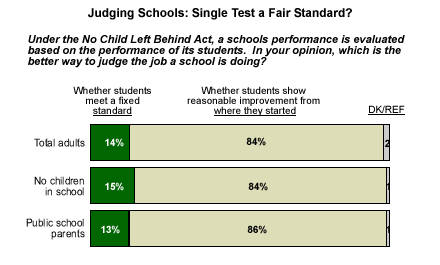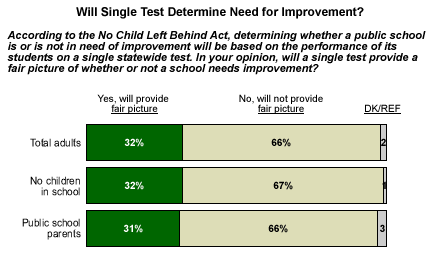This article contains findings from the 35th Annual Phi Delta Kappa/Gallup Poll of the Public's Attitudes Toward the Public Schools, released on Aug. 20 in Washington, D.C.
The No Child Left Behind (NCLB) Act of 2001 -- a law mandating strict, statewide achievement standards in public schools and tough consequences for schools that don't meet those standards -- is a central part of President Bush's plan to improve the nation's educational system. Schools across the country are beginning to feel the consequences: Two-thirds of the high schools in New Jersey received warnings this month that they do not meet the standards and must make improvements. More lawmakers and educators across the country are beginning to question the strategies used to enforce the law and whether it is meant to penalize or help schools. Most Americans say they are not familiar with the legislation, but the data suggest some opposition to some of its specific provisions.
The results of the 35th Annual PDK/Gallup survey* suggest that Bush's public relations efforts regarding NCLB have been largely unsuccessful. Only about a quarter of adults profess to have either a great deal (6%) or a fair amount (18%) of knowledge about the legislation, while 40% know very little about it and 36% know nothing at all. Despite the significant impact that NCLB is having in every public school district nationwide, those Americans with children in school are no more aware of NCLB than are those who do not have children in school.

All adults were asked to rate NCLB based on what they have heard or read about it. Nearly 7 in 10 Americans (69%) say they don't know enough about the act to rate it, and parents with children in school are no more able than others to venture an opinion.

Different surveys show varying degrees of public support for NCLB initiatives. A December 2002 survey conducted by the Winston Group for Americans for Better Education shows that 66% of Americans feel that raising standards and accountability is more important than increasing funding for improving education. The same survey also shows that 76% of Americans think parents with children in underachieving schools should be able to transfer their children to a better public school or charter school -- one of the major tenets of NCLB.
But Americans express less favorable opinions when asked about specific educational reforms that many argue are central to NCLB. For example, the PDK/Gallup poll suggests some opposition to measuring schools' performance according to a fixed standard. When offered two choices for "the better way to judge the job a public school is doing," 84% chose "whether students show reasonable improvement from where they started," and 14% chose "whether students meet a fixed standard." But the 2002 PDK/Gallup survey showed that the public did prefer, by a 68% to 30% margin, that all 50 states be required to "use a nationally standardized test" to track students' performance as opposed to "letting your state use its own test."

NCLB requires that schools be evaluated based on their students' scores on a single, statewide test. When asked if "a single test provides a fair picture of whether a school needs improvement," only 32% said yes, while 66% said no.

Data from other surveys reinforce that most Americans aren't fully comfortable with the idea of measuring schools' performance based on student achievement on state tests. According to a 2002 survey conducted for the PTA by Ipsos-Reid, just 30% of registered voters said that NCLB would be effective when told the academic performance of students and public schools is based primarily on the scores from state tests rather than on other measures of achievement.
However, when asked about the ability of tests to measure students' (as opposed to schools') performance, a January 2001 CNN/USA Today/Gallup poll found considerably more support. Forty-five percent of Americans said the use of a "single standardized test" was a fair way to "determine what a student knows or has achieved." Still, a majority (53%) thought it was unfair.
Whether or not they agree with NCLB's approach, the public opinion on one point is relatively clear: most Americans do not want the federal government deciding what is taught in their local schools. The majority of the nation's adults, according to the PDK/Gallup data, feel that the local school board should have the greatest influence in deciding what is taught in public schools in their area (61%). Fewer feel that the state government should have the most influence (22%), and only 16% feel that the federal government should have the most say.
As these data show, public opinion on specific educational policies are not firmly held and can vary a great deal depending on how the questions are asked.
Bottom Line
Regardless of the public's opinion on these specific issues, PDK/Gallup data show that most Americans simply don't know about the Bush administration's plan to fix failing schools. And as schools across the nation begin to grapple with the impact of the new guidelines for "making the grade" according to the NCLB standards, the Bush administration may face mounting pressure to revise them.
*The findings of the survey are based on telephone interviews with a random sample of 1,011 U.S. adults, aged 18 and older, conducted from May 28 to June 18, 2003. For results based on this sample, one can say with 95% confidence that the maximum error attributable to sampling and other random effects is ±3 percentage points.